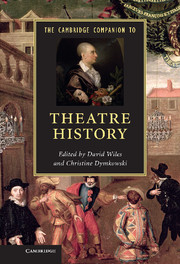4 - Medieval, renaissance and early modern theatre
from Part II - When?
Published online by Cambridge University Press: 05 February 2013
Summary
All historians divide the past into periods, distinguishing moments of decisive change from times of relative stability. There is no other way to give the past a shape and thereby perceive it as something other than a random stream of events. Every label we put upon a historical period is already an interpretation and contains a story embedded within it. There is no escaping from this process into objectivity. Telling the story of the past in terms of centuries may appear to be a neutral process, but it is not, for the world flows on when centuries change. Italian theatre historians are relatively comfortable when framing books or essays around the cinquecento, the 1500s, because at the start of that century we find dramatists adapting Roman comedies into Italian in a decisive move into ‘renaissance’ drama, whilst at the end we find dramatists, again in imitation of antiquity, creating new forms of music-theatre that will later be defined as ‘baroque opera’. English historians struggle harder to make ‘sixteenth-century drama’ work as a narrative frame and usually opt for ‘Tudor drama’, since the Tudor dynasty ruled from 1485–1603. Shakespeare’s writing career straddled two centuries, not to mention two dynasties, and he has become the reference point for creating a sense of English theatre history. His mid-career Hamlet was probably written in 1601, while nothing remarkable seems to have happened in around 1500. The ‘Sixteenth Century’ works as an organising frame if the English historian wants to trace a process that culminated in the masterpieces of Shakespeare, but it yields a different kind of story to the Italian cinquecento.
The word ‘medieval’ (i.e., of the ‘middle ages’) has proved one of the most resilient of all period labels. The idea of a time in the middle emerged as early as the fifteenth century, when Italian intellectuals tried to emulate a lost classical civilisation, believing that the ten centuries since the fall of the Roman Empire had been a time of cultural darkness. With the ruins of ancient buildings littered about their cities, Italians sensed the importance of a vanished civilisation and wanted to recoup what they saw as their own past; in the Germanic world of central Europe, on the other hand, the institution of the Holy Roman Empire implied that a line of continuity joined the first pagan emperors of Rome to their Christian successors, so the concept of a ‘middle’ ages dividing then from now was slower to emerge..
- Type
- Chapter
- Information
- The Cambridge Companion to Theatre History , pp. 55 - 72Publisher: Cambridge University PressPrint publication year: 2012
References
- 1
- Cited by



